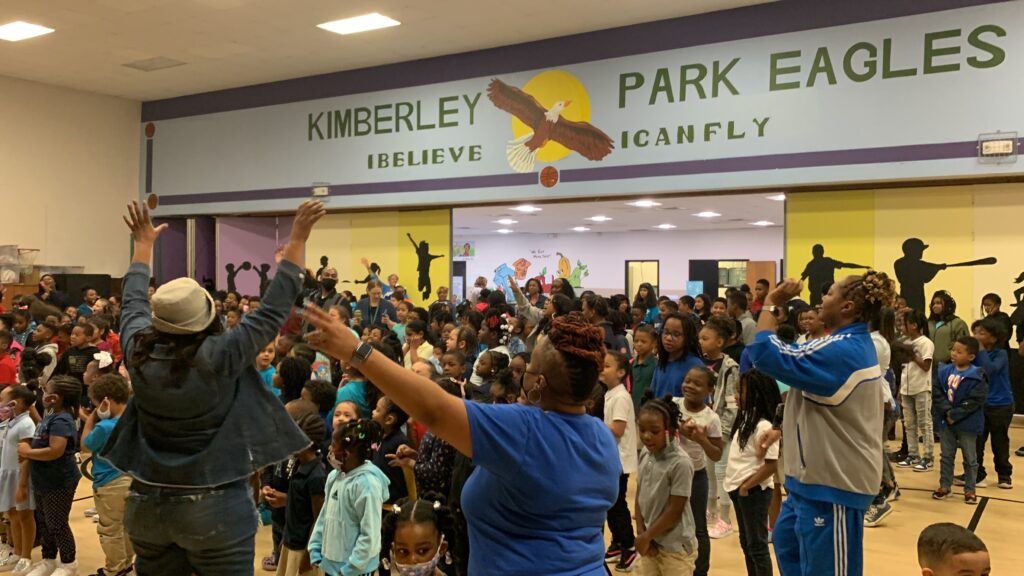Learning about feelings

As legislators move into conference negotiations, the budget items for early care and education on the table so far do not include new state funding for child care stabilization as federal relief funds dry up. The Senate proposal instead would redirect another pot of federal money to continue grants to programs to increase teacher compensation. Providers say that without the grants, it’s going to be even harder to find qualified staff — and affordable options for families will be even more scarce.
But the federal money the Senate budget included would run out before the end of the upcoming fiscal year, said Summer Tonizzo, spokesperson for the Department of Health and Human Services. The department would need another $40 million ($100 million total) for the grants to last through June 2024. The original request from advocates, the department, and policymakers was $300 million for the funds to last through the budget biennium.
Fortunately, my colleague Katie Dukes provided us with a break in the legislative back and forth since the last Early Bird. Katie spent time at Kimberley Park Elementary School in Winston-Salem to bring us the heartwarming story of a school embracing social-emotional learning, and the leaders behind that change.
As a “restart school,” which is a school with recurring low academic performance to which the state provides flexibility, Principal Diamond Cotton adopted Feeling Friends, a curriculum aimed at helping students understand and navigate emotions through 12 animal characters, including Lotta Love the LovaRoo, Angie the Angry Tiger, and Billy the Bully Goat.
Teachers and staff say they’ve noticed a meaningful change in the school’s culture, and in the mental and emotional health of students, teachers, and families.
“People walk into our building, and then they’re like, ‘It just feels different.’ And that’s what I want,” Cotton said.
Read on for a deep dive into the community surrounding the school, the inspiring woman, Miss KK, behind the Feeling Friends curriculum, and why social-emotional skills matter for early childhood learning.
Early Bird reads: What we’re writing
Cooper urges public to stand up for public schools in response to Senate budget
Gov. Roy Cooper declared a state of emergency for public education after the release of the Senate’s budget proposal.
Cooper has since been traveling to schools and early childhood programs to talk about the importance of public schools and why he’s concerned about the legislature’s budget proposals — with a focus on the Senate’s expansion of its opportunity scholarship program, which provides public scholarships for students to attend nonpublic schools.
Though Cooper’s campaign is focused on K-12 education, his special address two weeks ago noted his dissatisfaction with the General Assembly’s early care and education items as well.
“Families and businesses across the state have called for strong investments in early childhood education,” Cooper said. “But so far, the legislature is turning its back on children, parents, and the businesses that want to hire those parents, by shortchanging pre-K, Smart Start, and quality child care.”
Child care stabilization up in the air as legislators begin crafting a conference budget
“Given the current availability of ARPA funding, NCDHHS will either have to cut funding for child care subsidy that helps working families afford child care, or discontinue funding for early childhood teacher pay increases and bonuses midway through the upcoming fiscal year that have proven essential in helping to stabilize a fragile child care industry,” Tonizzo said. “Both are needed to avoid a crisis for children, families, and employers.”
A 34-county listening tour asked parents and providers: What should child care look like?
In case you missed it in the last edition of Early Bird, I wrote about the findings from a 34-county listening tour seeking to understand what families need and desire from an ideal early care and education system.
The responses highlight how aspects of policies and programs limit parents’ access to high-quality child care, like the state’s Quality Rating Improvement System and the federal child care subsidy program.
The tour was conducted by Care and Learning (CandL), a coalition of organizations pushing for a more publicly funded system of early care and education, and funded by private philanthropy.
In other early learning news: What I’m reading
A striking gap between deaths of Black and white babies plagues the South - From NC Health News
Early Childhood: How to bring more nature into preschool - From The Hechinger Report
A Tragically American Approach to the Child-Care Crisis - From The Atlantic
Early childhood education: What do we know and what should we do? - From The Brookings Institution
Why child care can’t be overlooked as an issue in 2024 - From The 19th News
Congress crosses the aisle on child care - From Politico
Research & Resources: Let's talk early childhood intervention and special education
The National Institute for Early Education Research (NIEER) releases state-by-state analyses of public preschool programs, which EdNC has covered for many years. Go here for our coverage of NIEER’s annual preschool snapshot in May.
But this year, NIEER did something different. It released “the first equity-focused report to look state-by-state at the two federally funded programs for young children with disabilities.”
Since young children often find themselves in a variety of settings, delivering special education services is more complicated than for school-age children. The report looks at students’ experiences in the 2020-21 school year, while the pandemic made that delivery even harder. It breaks down the variation in young children’s access to special education and early intervention services by COVID experiences, race and ethnicity, gender, and state.
North Carolina’s access (find the state profile on page 189 of the report) was below the national average for most age groups of children 0 to 6. One percent of infants, 2% of 1-year-olds, 4% of 2-year-olds, 2% of 3-year-olds, and 5% of 4-year-olds received early intervention or special education services that first pandemic year.
North Carolina children’s access to these services has been mostly below (or right at) the national average when looking at the past decade.
The report calls for three things: more federal funding to address economic disparities in access, the creation of a national commission to study how to address inequities in early childhood special education, and the collection of better data on these programs.



